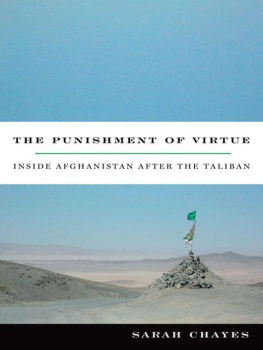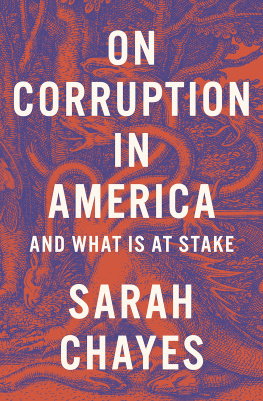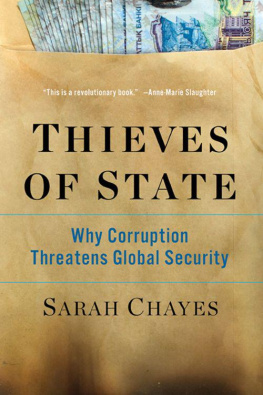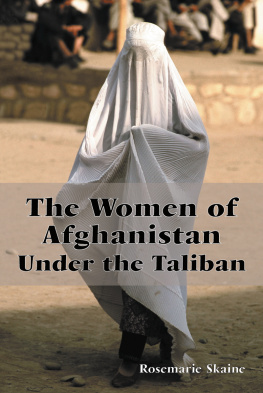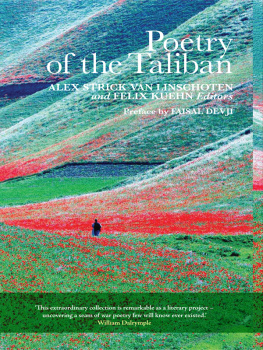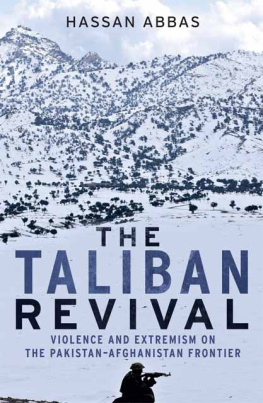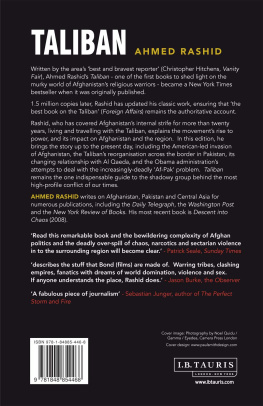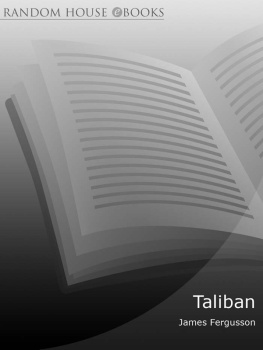Sarah Chayes - The Punishment of Virtue: Inside Afghanistan After the Taliban
Here you can read online Sarah Chayes - The Punishment of Virtue: Inside Afghanistan After the Taliban full text of the book (entire story) in english for free. Download pdf and epub, get meaning, cover and reviews about this ebook. year: 2006, publisher: Penguin, genre: Detective and thriller. Description of the work, (preface) as well as reviews are available. Best literature library LitArk.com created for fans of good reading and offers a wide selection of genres:
Romance novel
Science fiction
Adventure
Detective
Science
History
Home and family
Prose
Art
Politics
Computer
Non-fiction
Religion
Business
Children
Humor
Choose a favorite category and find really read worthwhile books. Enjoy immersion in the world of imagination, feel the emotions of the characters or learn something new for yourself, make an fascinating discovery.
- Book:The Punishment of Virtue: Inside Afghanistan After the Taliban
- Author:
- Publisher:Penguin
- Genre:
- Year:2006
- Rating:5 / 5
- Favourites:Add to favourites
- Your mark:
- 100
- 1
- 2
- 3
- 4
- 5
The Punishment of Virtue: Inside Afghanistan After the Taliban: summary, description and annotation
We offer to read an annotation, description, summary or preface (depends on what the author of the book "The Punishment of Virtue: Inside Afghanistan After the Taliban" wrote himself). If you haven't found the necessary information about the book — write in the comments, we will try to find it.
Sarah Chayes: author's other books
Who wrote The Punishment of Virtue: Inside Afghanistan After the Taliban? Find out the surname, the name of the author of the book and a list of all author's works by series.
The Punishment of Virtue: Inside Afghanistan After the Taliban — read online for free the complete book (whole text) full work
Below is the text of the book, divided by pages. System saving the place of the last page read, allows you to conveniently read the book "The Punishment of Virtue: Inside Afghanistan After the Taliban" online for free, without having to search again every time where you left off. Put a bookmark, and you can go to the page where you finished reading at any time.
Font size:
Interval:
Bookmark:


INSIDE AFGHANISTAN AFTER
THE TALIBAN
THE PENGUIN PRESS
NEW YORK
2006
THE PENGUIN PRESS
Published by the Penguin Group
Penguin Group (USA) Inc., 375 Hudson Street, New York, New York 10014, U.S.A. Penguin Group (Canada), 90 Eglinton Avenue East, Suite 700, Toronto, Ontario, Canada M4P 2Y3 (a division of Pearson Penguin Canada Inc.) Penguin Books Ltd, 80 Strand, London WC2R 0RL, England Penguin Ireland, 25 St. Stephens Green, Dublin 2, Ireland (a division of Penguin Books Ltd) Penguin Books Australia Ltd, 250 Camberwell Road, Camberwell, Victoria 3124, Australia (a division of Pearson Australia Group Pty Ltd) Penguin Books India Pvt Ltd, 11 Community Centre, Panchsheel Park, New Delhi110 017, India Penguin Group (NZ), Cnr Airborne and Rosedale Roads, Albany, Auckland 1310, New Zealand (a division of Pearson New Zealand Ltd) Penguin Books (South Africa) (Pty) Ltd, 24 Sturdee Avenue, Rosebank, Johannesburg 2196, South Africa
Penguin Books Ltd, Registered Offices:
80 Strand, London WC2R 0RL, England
First published in 2006 by The Penguin Press, a member of Penguin Group (USA) Inc.
Copyright Sarah Chayes, 2006
All rights reserved
LIBRARY OF CONGRESS CATALOGING IN PUBLICATION DATA
Chayes, Sarah, 1962
The punishment of virtue: inside Afghanistan after the Taliban /Sarah Chayes.
p. cm.
Includes index.
ISBN: 978-1-1012-0164-0
1. AfghanistanHistory2001. 2. Afghan war, 2001. 3. Kandahar (Afghanistan)History21st century. 4. War correspondentsAfghanistan. 5. Chayes, Sarah, 1962.
I. Title.
DS371.4.C43 2006
958.104'7dc22 2006043499
Maps by Jeffrey L.Ward
Without limiting the rights under copyright reserved above, no part of this publication may be reproduced, stored in or introduced into a retrieval system, or transmitted, in any form or by any means (electronic, mechanical, photocopying, recording or otherwise), without the prior written permission of both the copyright owner and the above publisher of this book.
The scanning, uploading, and distribution of this book via the Internet or via any other means without the permission of the publisher is illegal and punishable by law. Please purchase only authorized electronic editions and do not participate in or encourage electronic piracy of copyrightable materials. Your support of the authors rights is appreciated.
IN HONOR OF ABRAM CHAYES, MY FATHER
AND
MUHAMMAD AKREM KHAKREZWAL,
WHO DIED TRYING
JUNE 2005
T HE ROAD TO K HAKREZ is graveled now, a hard right turn off cement thick enough to bear the weight of Soviet tanks. It passes behind Elephant Rock and the stony crests that form the northern bulwark of the city of Kandahar. It crosses the Arghandab plain, leaving behind its shock of leafy, mud-walled orchards, then climbs through another range of rocky hills to a plateau, with more mountains bulking in the distance. It is a beautiful road, profoundly peacefulthough once the scene of violent battles against the Soviets.
We drive in a convoy, lights and blinkers on, Toyota Land Cruisers mostly, and white-and-green police pickup trucks flanking the black van that bears the body of Muhammad Akrem Khakrezwal. I am in one of these.
A few hours earlier I sat in that van, keeping him company for a little while. Afghans dont do that. They dont sit with the bodies of their dead. But I couldnt keep myself away. There he is, your friend! his brother had cried at me hoarsely as he pulled back the blanket to show me his face. It was perfect, come to rest in that stern, almost brooding expression of his. Only a nick, a bit of a bruise, and a scrape above the right eye marred his features. Then what killed him?
A few minutes later, we loaded him, limp and heavy, into the black van. People were flocking to the disused school building near his house, requisitioned for the purpose of receiving them: his brothers serving as hosts, his heartbroken bodyguards and tribal elders weeping silently, raising the long tails of their turbans to their eyes, police officers in uniform, squeezing down to sit cross-legged on the broad veranda. Two men wrestled great blocks of ice to the ground in front of a bank of rose bushes, and left them there. Someone talked about lunch. What do we want with lunch? a voice assuaged him. There was obsessive speculation, punctuated by the lament of Akrems older brotherquestions flung at the skyand by pauses for prayers murmured in unison with hands spread wide. But he was alone in there. And after a time I went to sit with him. I could feel the heat radiating up from the floor of the van, despite the air-conditioning that drew on the motor in pulses like long painful breaths. He seemed so alone, and so small, under his blanket. He who, alive, had been so much the opposite. I sat there with him, a little steadied by his presence beside me. I sat there to stave off my own sudden aloneness, in this impossible place.
It was a suicide bombing. Thats what I had heard on the radio, and Akrems name. And I had dropped everything. A suicide bombingscourge of our young twenty-first centurywords with the alchemy to terrify, to paralyze, wherever they are heard on this earth. It was a suicide bombing in a mosque, no less, my favorite mosque in Kandahar: the ancient one made of mud plaster in the middle of the bazaar, with the four towers leaning a little jauntily into the sky.
An Arab had done it, the governors thick-lipped voice had lisped on the radio. Documents had been found to prove it, he said. An image was making the rounds, of a young man in a soldiers uniform who had bent down in front of Akrem, as though to reach for his hand to kiss, right before the explosion. That would be the Arab, the implication was. And then, an instant later, the pandemonium so familiar by now from television footage, or worse. The sobs, the smoke, the broken glass, the chunks of bodiesnaked, cauterized by the heatthe burning hanks of cloth and hair, the stunned survivors wandering about dazed, the medics overwhelmed. It was carnage. More than twenty dead, dozens injured.
And yet something wasnt quite right with this account. In Afghanistan, there are ways you know things. Outsiders call it rumor mongering or conspiracy theorizing, and when they ask you for some evidence, for something concrete to substantiate this gut feeling of yours, you shrug a little sheepishly because you have to admit theyre rightyoure only speculating. But still, you know. There is a tuning fork vibrating inside you to the true pitch. A tuning fork forged through years spent here, absorbing the underlying pattern. Because there is a pattern, despite the surface chaos. It just takes some time to grasp its contours.
An Arab suicide bomber does not fit the pattern. We just know it. But now is not the time to prove it. Now we have to go through the motions.
The streets of Kandahar, the dirt roads weaving through baked mud villages, are lined with people, standing silently, watching our cortege pass by. At the left turn leaving Arghandab, about a half hour outside of town, Mullah Naqib and his men, dressed in flowing tunics, turbans or lengths of cloth tied about their heads, have grouped themselves beside the road, symbolically ushering us through their territory. Im sitting in the middle, and I catch a glimpse of them through the window and my daze. Mullah Naqib, the old warhorse who drove the Soviets out of the Afghan south, looks bowed, his sheeps fleece of a beard shot with gray, his shoulders a little stooped despite the urgency exuding from him as he waves each truck past. Akrem was his armor commander during the decade-long anti-Soviet resistance.
Font size:
Interval:
Bookmark:
Similar books «The Punishment of Virtue: Inside Afghanistan After the Taliban»
Look at similar books to The Punishment of Virtue: Inside Afghanistan After the Taliban. We have selected literature similar in name and meaning in the hope of providing readers with more options to find new, interesting, not yet read works.
Discussion, reviews of the book The Punishment of Virtue: Inside Afghanistan After the Taliban and just readers' own opinions. Leave your comments, write what you think about the work, its meaning or the main characters. Specify what exactly you liked and what you didn't like, and why you think so.

